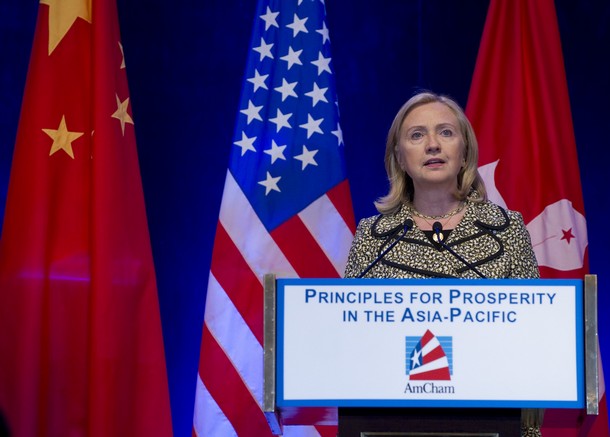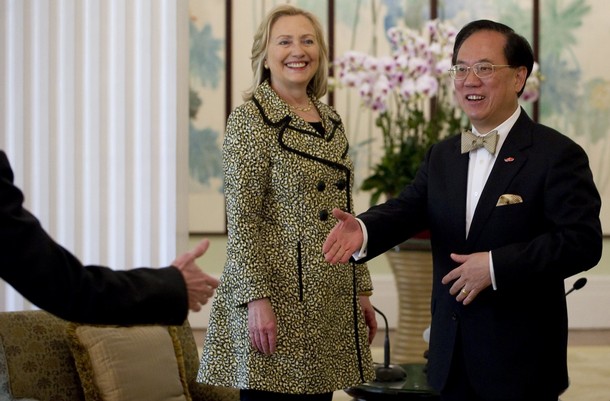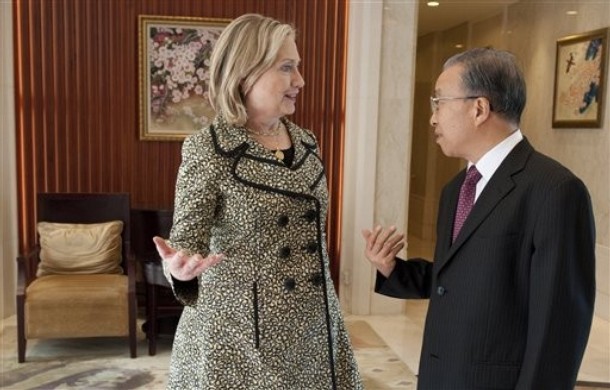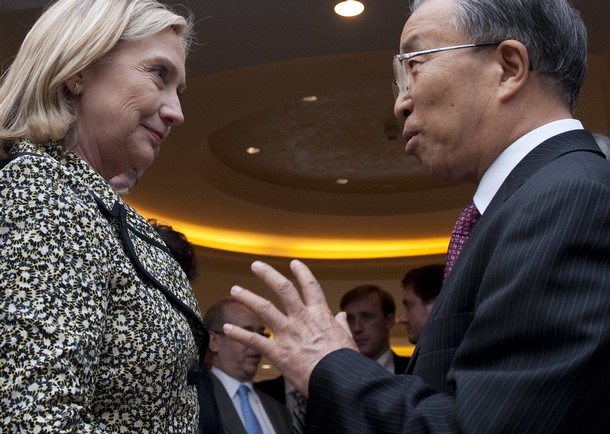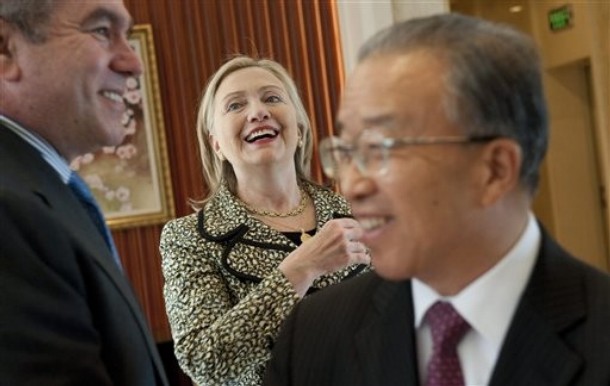Hillary Clinton With Algerian President Abdelaziz Bouteflika
October 29, 2012 by still4hill

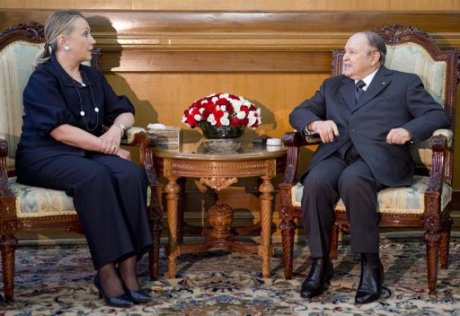
The published remarks were meager, but the meeting was three hours long. Months afterwards, GE was awarded the contract Hillary was promoting. Generators and turbines being built in the U.S. for this contract support thousands of manufacturing jobs here. This, Hillary tells us, is why energy and economics must be at the heart of diplomacy.
She tells us that on accepting her post in 2009 she was faced by two major questions:
- Could we build and sustain good jobs at home and speed up the economy by opening new markets and boosting exports?
- Were we going to let China and other relatively closed markets perpetually rewrite the rules to the disadvantage of our industries and workers
Hillary outlined her argument for fair trade agreements to be presented in Hong Kong later that month at this event in July 2011.
Secretary Clinton at the 2011 U.S. Global Leadership Coalition (USGLC) Conference
July 12, 2011 by still4hill
Our foreign policy must be a force for economic renewal here at home. We all know that families are struggling to get back on their feet after the most severe economic downturn since the Great Depression. We all know we face genuine economic competition in more sectors, from more companies, from more places than ever before, whether it’s from Indian pharmaceutical companies or Brazilian jet manufacturers. And all of us here today recognize that a strong economy at home is vital to America’s leadership in the world. Now there will be many prescriptions for what is needed. My plea is that the prescriptions be evidence-based and not ideological or even theological, as sometimes they seem to be....Then she went on the world stage with her case, as she recounts.
In Hong Kong later this month, I’ll be speaking about the rules and values that support our global economic order. And this fall, I plan to give a larger address on economics and America’s strategic choices. But today, I want to tell you about how we are using the tools of our foreign policy to create American jobs.
Secretary Clinton’s Remarks on Principles for Prosperity in the Asia Pacific
July 25, 2011 by still4hill
The United States approaches this question with great humility, and with hard-won lessons learned from overcoming difficult economic challenges throughout our history.
We must start with the most urgent task before us: realigning our economies in the wake of the global financial crisis. This means pursuing a more balanced strategy for global economic growth – the kind that President Obama and President Hu Jintao have embraced, and the G20 is promoting...
Last March in APEC meetings in Washington, I laid out four attributes that I believe characterize healthy economic competition. And these are very simple concepts, easy to say, hard to do: open, free, transparent, and fair. Hong Kong is helping to give shape to these principles and is showing the world their value...
... all who benefit from open, free, transparent, and fair competition have a vital interest and a responsibility to follow the rules. Enough of the world’s commerce takes place with developing nations, that leaving them out of the rules-based system would render the system unworkable. And that, ultimately, that would impoverish everyone.
Her words were preempted and shadowed by the debt-ceiling debate in Washington. Hillary, in Hong Kong was greeted with questions about U.S. solvency and bravely assured that of course we pay our debts secretly praying that we would. Her words in the book eloquently communicate her level of frustration with the situation in which her government in D.C. had placed her. "Period."
She was putting on a confident face for all of us, but she should not have had to. The meeting with Donald Tsang (above) was one thing. The subsequent one with Dai Bingguo was another. Amid the customary smiles, she ended that meeting telling him, "We could spend the next six hours talking about China's domestic challenges."
For Hillary, export promotion was a personal mission. Not just the big companies, the small ones, too. Her persistence with Russia won a Boeing contract. Not immediately. It took time, but it succeeded.
Secretary Clinton’s Remarks Following Tour of Boeing Design Center
October 14, 2009 by still4hill

Among the very successful initiatives was "Open Skies" which reached 100 partners in early 2011, provides for direct flights, bolsters local economies by hundreds of millions of dollars, and supports thousands of jobs. (Go to Hillary for the wonky numbers.)
Secretary Clinton’s Remarks at Celebration of 100 Open Skies Partners
March 30, 2011 by still4hill
Discussing
labor, transported jobs, and low standard working conditions, she also
addresses forced labor and human trafficking. She relates stories of
horrendous working conditions as told to her on this visit.Hillary Clinton in Cambodia Part 3: Siem Reap Center Visit Slideshow
October 31, 2010 by still4hill

Watching Al Jazeera, I learned about this. Oddly, one woman says she makes her little boys do this to finance her daughter's education. It is dangerous - deadly. Some boys are badly disabled very young, and the horses are so little and are beaten - hit on the face and abused. The old men say this is tradition. Like many supposed traditions, much about this is downright criminal. Hillary does not mention it. As far as I know she might never have heard of it since the story came out today. I thought I would add it here since the subject of forced child labor is prominent here.
Forced labor, child and animal abuse in one "traditional" package. If Hillary saw this, I am sure she is having a fit! Today I saw these disturbing figures from the Department of Labor: 168 million children worldwide engaged in manual labor; 85 million in hazardous labor.This happens, of course, because of limited earning options for adults.
Horse Play: Child Jockeys in Indonesia
Written by Rebecca Henschke Fri,08 November 2013 | 16:30
In the remote eastern part of Indonesia, children as young as four or five work as professional child jockeys. On the island of Sumba, famous for its horses, racing festivals are recently held.Earlier this month, a race in the east of the island lasted 11 days and attracted nearly 600 horses.
And all the jockeys were under 11 years old…
I meet one of them, 7-year-old Ade... who comes below my waist.
He’s putting on a balaclava so I can now just see his eyes and mouth. He’s also wearing a small helmet and no shoes.
He has a black eye from when he fell off a horse and he has been doing this job since he was four.
Ade doesn’t own a horse. So he is here hoping someone will hire him as their jockey.
Hillary mentions that she added the U.S. to the annual trafficking in persons report. This was not a popular move when she initiated it. It ruffled a lot of feathers, but her argument for doing so is hard to refute. She brought in Lou CdeBaca to address this.
Hillary Clinton Releases the Ninth Annual Trafficking in Persons Report
June 16, 2009 by still4hill
... I’m especially pleased that our new Ambassador Luis CdeBaca, the new director of the Office to Monitor and Combat Trafficking in Persons here at the State Department was confirmed in time for him to be part of this ceremony...You see some of the reactions to her addition of the U.S. in this post.when she released the report the next year.
We are including more information about the United States in our report. I believe when you shine a bright light you need to shine it on everyone, and we will rank ourselves. We believe we’re Tier 1, but we will rank ourselves next year in the report so that we have done our duty as well.
Secretary Clinton Announcing the Release of the 2010 Trafficking in Persons Report
June 14, 2010 by still4hill
Today we release the 10th annual Trafficking in Persons Report. I remember very well when we got the wheels in motion for this process because we wanted to document the persistent injustice of modern slavery. We wanted to tell the stories of men, women, boys, and girls held in forced labor or sexual servitude around the world. And for the first time ever, we are also reporting on the United States of America because we believe it is important to keep the spotlight on ourselves.
Secretary Clinton at Release of Trafficking In Persons Report 2011
June 27, 2011 by still4hill
Hillary Clinton Releases 2012 Trafficking In Persons (TIP) Report
June 19, 2012 by still4hill
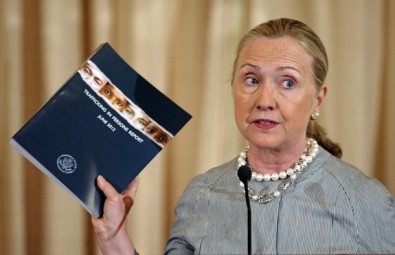
Hillary Clinton’s Townterview in Bangladesh
May 6, 2012 by still4hill
QUESTION: (Via interpreter.) My name is Alia Atta. I am the general secretary for BGIF. We work with workers’ rights. And there we face all kinds of obstructions with the police, goons, thugs, and false allegations in court. And, in fact, one of our leaders, Aminul Islam, was very brutally murdered. With such conditions, how can we work with the cause of workers’ rights? Thanks.
SECRETARY CLINTON: Thank you. (Applause.) And – well, first let me say that I spoke out strongly to point that there needed to be an independent investigation into the murder of Mr. Islam, because certainly his family and his colleagues deserve answers about what happened to him. So on that particular case, this is a real test for the government and for the society to make sure you don’t say that anyone can have impunity. That’s a key issue for the rule of law.
Secondly, on your larger question, the history of labor rights and labor unions in any developing society is always difficult. There are strong forces that oppose workers being organized. We have this in my own country. You go back to the 19th and the early 20th century when labor unions were just getting started, there were goons, there were thugs, there were killings, there were riots, there were terrible conditions. We passed laws at the beginning of the 20th century against child labor, against too many hours for people to work, but that took time. It took time to develop a sense of political will to address those issues. So you are beginning that, and it’s a very important struggle. I think in today’s world, everything is accelerated because everything is known. There are no secret issues that can’t be exposed. There are exposes about factories from China to Latin America. So you are doing very important work. Do not be discouraged or intimidated. But you deserve to have the support of your government and your society.
The third point I would make is that we have worked from Colombia to Cambodia with the owners of factories and other enterprises to help them understand how they can continue to make a very good profit while treating their workers right. And in fact, we have spent a lot of time trying to help owners of businesses understand how to do that. And it’s worked. And we have people who are quite experts in that.
For many years, Colombia, the country in South America that has one of the fastest-growing economies in the world right now, had hundreds of labor organizers killed. And they were killed by economic forces and political forces that didn’t want to share power, didn’t want to share profits, who didn’t see that that was part of the obligation of democracy and society. So we have seen this happen all over the world, and we stand ready to work with factory owners and labor organizers to have a better dialogue, to understand what can work, and then to help you implement it.
So I thank you for raising it because it’s a part of becoming a middle class country. Workers deserve to have their labor respected and fairly paid for. Factory owners deserve to have what they pay for, which is an honest day’s work for the wages that they pay. So there is a way to accommodate those interests, and we’ve seen it, and we can continue to work with you to try to achieve it.

On the topic of energy, Hillary mentions what she calls "the resource curse" - her term for resources engendering corruption and uses Nigeria as an example of a country where she repeatedly warned that corruption needed to be tackled and the profits from resources fairly distributed.
Hillary Clinton’s Town Hall in Nigeria
August 12, 2009 by still4hill
Hillary Clinton With Nigerian Foreign Minister Ojo Maduekwe
August 12, 2009 by still4hill
Hillary Clinton Pays a Visit to Nigeria Speaks with President Jonathan
August 9, 2012 by still4hill
One energy issue Hillary addressed through the Clinton Foundation was that of toxic fuels for cooking. She provides statistics revealing the global health threat posed by cooking in unventilated areas using toxic fuels, a problem that led her to a solution.
Secretary Clinton Announces the Global Alliance for Clean Cookstoves at the Clinton Global Initiative
September 21, 2010 by still4hill
Secretary Clinton’s Remarks on Global Alliance for Clean Cookstoves at the Clinton Global Initiative
September 21, 2010 by still4hill
Before we even get to the chapter on Haiti, I can attest to one other problem created by the use of charcoal there. Deforestation. The mountains are denuded and whenever there are big tropical storms and hurricanes, the floods and torrents are deadly. It is not a direct threat from the toxic fuels (that exists as well of course), but represents danger to life and limb.
Secretary Clinton and Julia Roberts Joint Op-Ed: ‘Clean stoves” would save lives, cut pollution
May 8, 2011 by still4hill
Secretary Clinton’s Video Remarks for NIH Cookstove Workshop
May 11, 2011 by still4hill
Secretary Clinton Recruits Seven More African Allies for Clean Cookstoves
June 16, 2011 by still4hill
Hillary Clinton Assumes Leadership Chair at Global Alliance for Clean Cookstoves
September 30, 2013 by still4hill

Hillary ends this chapter with an eloquent argument for the growth of a global middle class that will ensure our own growth, more common ground with our international neighbors, and, a a result, a more secure America in the future.
__________________________________________________________
Hillary Clinton’s ‘Hard Choices’ Retrospective: Introduction
__________________________________________________________####

